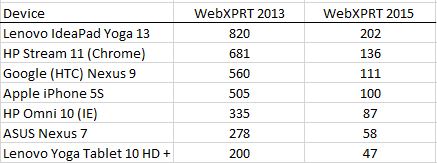While WebXPRT 2015 has been running fine on earlier beta versions of Windows 10, we have found a problem on some recent versions. Starting with build 10122, the Local Notes test hangs when using the Microsoft Edge browser. (Note: This browser still identifies itself as Spartan in the builds we have seen.) Chrome and Firefox on Windows 10 have successfully run WebXPRT 2015, so the problem appears to be restricted to Edge/Spartan.
Because WebXPRT ran successfully on earlier builds of Windows 10, we are hoping that upcoming builds will resolve the problem. However, we have been investigating the issue in case there is something we can address. The problem is that the encrypted strings that the test is trying to write to LocalStorage are not being written correctly. Non-encrypted strings are being written correctly.
As soon as the problem gets resolved, we’ll let you know.
In other news, we’ve been looking at Android M. There are a lot of interesting changes coming, such as the difference in the way that Android M manages app permissions. We’ve decided to delay releasing the design document for the next version of MobileXPRT so that we can make sure that the design deals with these changes appropriately.
Eric














